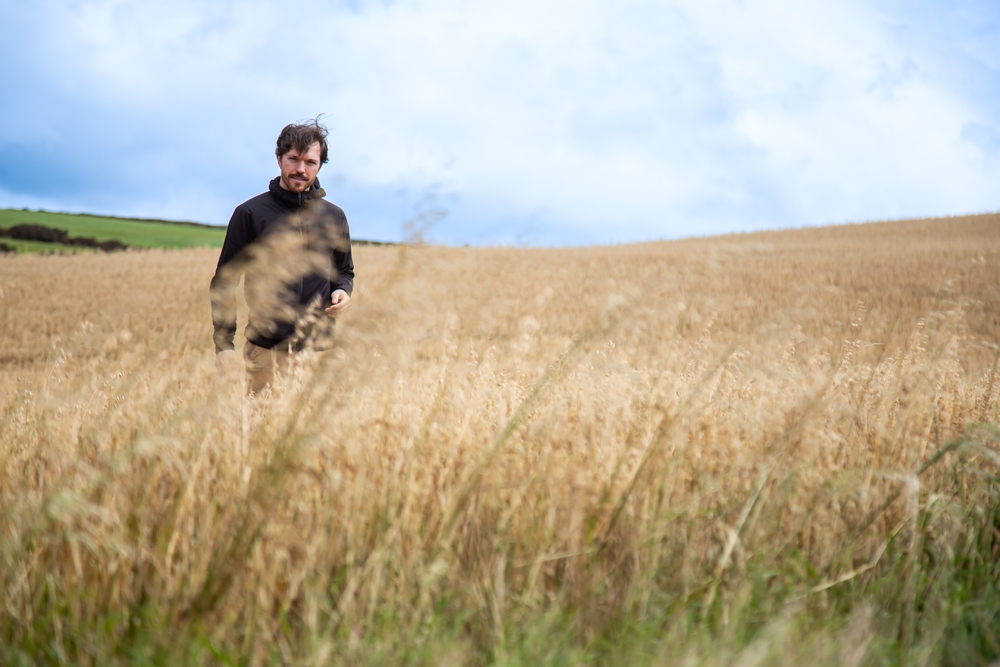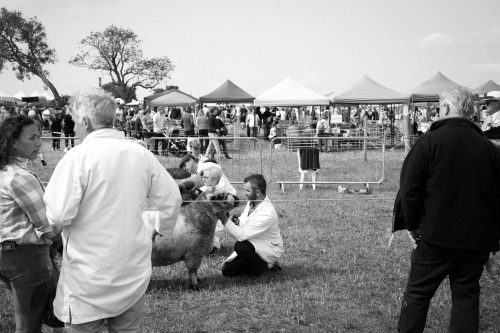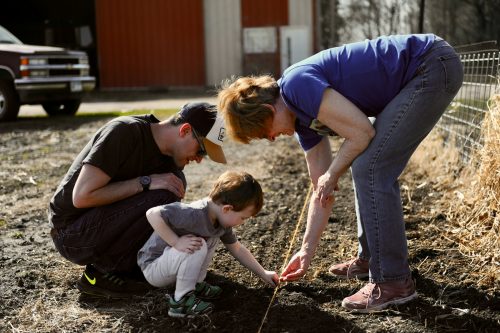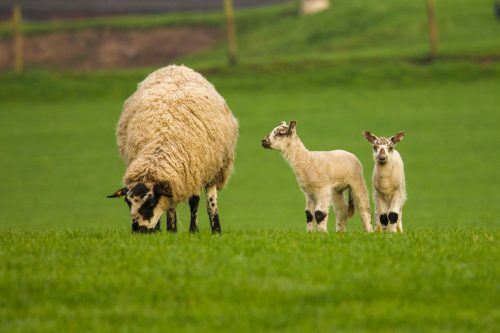

Farming is often described as not just a job, but a way of life. In Ireland, where nearly all farms (99.7%) are family-run, the lines between work and home can be especially blurred (Central Statistics Office, 2018). While this deep integration of family and farm can bring a strong sense of purpose, it can also create strain (Donohoe, 2024; Leshed et al., 2014). Farmers may find it difficult to switch off, attend family events, or balance parenting with the never-ending demands of the farm (Roy et al., 2017).
Work–Family Conflict (WFC), described as the tension between work demands and family responsibilities, has been widely studied in professions such as healthcare (Gonnelli et al., 2018; Stanley et al., 2025), but has rarely been examined in relation to the occupation of farming. For farmers, WFC often arises through spillover (when work-related stress carries over into family life) and crossover (when stress affects not just the farmer, but also their spouse or family), largely because work, family, and leisure are so closely intertwined (Sprung et al., 2022).
Despite growing evidence that farming is linked to high stress, poor mental health, and even elevated suicide risk, no research until now has explored WFC among farmers in Ireland – remarkable, considering that for a relatively small country, it is an outsized heavy-hitter in grass-based livestock farming, being inter alia the largest EU exporter of beef, and the sixth largest exporter in the world (Department of Agriculture, Food and the Marine, 2020).
This new study by Siobhán O’Connor et al (2025) is the first to do so. Having completed a preliminary literature search on matters relating to economic disparities and gender roles among farmers, as well as conflict initiators from family structures to the weather, the team set out to determine, first, whether a Work-Family Conflict is present among Irish farmers, and second, whether levels of it vary according to socio-demographic factors, mental health, social support, and farm-specific stressors.

When your farm is your home, the boundaries between work and family life disappear.
Methods
The team carried out cross-sectional surveys using multiple structured tools, of 446 farmers in Ireland, recruited both online and through in-person agricultural marts and shows.
They measured:
- Work–Family Conflict (WFC): on the 5-item Work-Family Conflict scale
- Mental health (depression, anxiety, stress, suicidality, wellbeing): by self-rating, Depression, Anxiety, and Stress Scales-21 (DASS-21), Depressive Symptom Inventory- Suicidality Subscale (DSI-SS), and the 14-item Mental Health Continuum-Short Form (MHC-SF) respectively.
- Psychological skills (flexibility, cognitive fusion, sense of self): by the 6-item PsyFlex; 7-item Cognitive Fusion Questionnaire (CFQ); 15-item 7-item Self-Experiences Questionnaire (SEQ)
- Social support: by the Multidimensional Scale of Perceived Social Support (MSPSS-R-3)
- Farm-specific stressors (financial, operational, isolation, government-related pressures): using Welke’s Farm/Ranch Stress Inventory (FRSI).
- Farm attachment (the emotional connection to one’s farm): using Welke and Vaske’s adapted Farm Attachment Inventory (FAI).
They also collected demographic and farm-related data (age, gender, marital status, farm size, hours worked, children, farm enterprise, annual income, off-farm employment).

The cohort comprised 446 Irish farmers, recruited both online and through agricultural shows.
Results
High levels of conflict
On average, farmers scored 25 out of a possible 35 on the WFC scale, indicating moderately high levels of conflict. Almost half said they often had to change family plans because of farm duties, or that household tasks simply didn’t get done because the farm came first.
Who feels it most?
WFC was not spread evenly. Younger farmers tended to report higher conflict than older ones. The link was statistically significant, meaning it is very unlikely to be due to chance. Having young children also mattered: farmers with children under five scored, on average, four points higher than those without. This is a sizeable difference and shows that balancing childcare with farming is especially difficult.
Gender differences also emerged. Male farmers reported higher conflict than female farmers, though the gap was smaller than expected.
Type of farm played a role too; dairy and mixed farmers experienced more conflict than beef farmers, which may reflect the relentless nature of dairy farming, with milking required twice a day, every day, and more variability of income.
Size of farm and working hours both mattered. Farmers working on larger holdings or those putting in very long days (sometimes up to 18 hours) reported significantly higher conflict. The statistical analysis showed a clear pattern: the longer the hours, the greater the spillover into family life.
The mental health connection
The study also revealed a strong link between WFC and mental health, though it is not possible to establish unidirectional or bidirectional causality. Farmers who rated their mental health as ‘excellent’ had very low conflict scores (around 19), while those who rated their health as ‘poor’ scored nearly 28. That gap, almost nine points on a 35-point scale, is both clinically and statistically significant.
More detailed measures showed the same trend. Higher WFC scores were consistently associated with more symptoms of depression, anxiety, and stress. Farmers who reported more conflict also reported more thoughts of suicide. On the flip side, those with higher wellbeing reported less conflict. These associations were all highly significant, suggesting that work-family conflict and mental health are deeply intertwined.
Skills and supports
The researchers also explored psychological resources. Farmers with greater psychological flexibility; the ability to adapt and not get stuck in unhelpful thoughts, reported lower WFC. Conversely, those who felt ‘fused’ with stressful thoughts, or had a more rigid sense of self, tended to score higher.
Social support also played a role. Farmers who felt less supported by family, friends, or significant others had higher levels of conflict. The statistical link here was weaker than for mental health, but still significant.
Stressors and spillover
Not surprisingly, the pressures of farming life were closely linked to conflict at home. Farmers who experienced high workload stress, frustrations with government regulations, or operational challenges reported the greatest levels of WFC. In fact, workload stress showed the strongest correlation of any factor in the study, suggesting that when the farm demands more and more, family life is most at risk of being squeezed out.
Pulling it together
To untangle which factors mattered most, the researchers ran a regression model; a way of looking at multiple influences at once. Together, six factors explained nearly 40% of the variation in WFC:
- being younger,
- being male,
- having young children,
- working longer hours,
- facing greater farm-specific stressors, and
- having lower psychological flexibility.
Interestingly, while strong attachment to the farm was linked with conflict in simple comparisons, it didn’t remain significant once other factors were considered.

The demands of the job can break farmers and families; particularly for men with younger kids, working longer hours, who are less able to cope with uncertainty.
Conclusions
The findings highlight farming as a high-risk occupation for work-family conflict (WFC), which in turn is strongly linked to poor mental health outcomes. Some of the main take-home messages are:
- Family life matters for farmer wellbeing. Younger farmers with children under five are at particular risk of conflict.
- Structural stressors (workload, government regulations, financial pressures) feed directly into WFC and mental distress. Policy and advisory services need to acknowledge these realities.
- Psychological flexibility, the ability to adapt and not get ‘fused’ with stressful thoughts, emerged as a protective factor, suggesting scope for Acceptance and Commitment Therapy (ACT) based supports.
- Social support networks (family, friends, peers) remain crucial buffers, but WFC may undermine these, creating a vicious cycle.
- Community-based interventions that keep farmers and their families at the centre, such as the On Feirm Ground mental health training for farm advisors (Hammersley et al., 2025), could be expanded to explicitly address WFC.
Strengths and limitations
This is the first study to look at WFC in Irish farmers, and that alone makes it a valuable contribution. The relatively large sample, use of validated scales for mental health and wellbeing, and recruiting both online and face-to-face at agricultural marts and shows are definite strengths.
Insofar as demographic skews such as gender (74% of study participants being male) were identified, they were broadly in line with the true farming demographic of Ireland (only 13% female; HER-SELF Project, Department of Agriculture, Food and the Marine, 2022), which indicates that the cohort sampled was reasonably representative of the population under study. Although it is perhaps a limitation that this study does not adequately focus on the methodology of its preliminary literature review, it is evident that the study is designed throughout keeping demographic differences, from gender and family roles to economic pressures, in mind.
However, there are more substantive limitations to consider in this paper. The biggest is the cross-sectional design. Because everything was measured at one point in time, we don’t know whether WFC causes poor mental health, or whether people who are already struggling are more likely to report higher conflict. Further longitudinal studies should tease out causality and directionality, in the relationship between difficulties reconciling work and family life, and surrounding or resulting mental illness and risk.
Another issue is selection bias. Farmers had to choose to take part, and recruitment leaned heavily on social media and events. That may create a risk of the sample over-representing those who are already socially engaged, and interested in issues around stress and wellbeing. For instance, the over-representation of both more younger farmers than the national profile, may be in circumstances where younger people have relatively less stigmatisation or more technological literacy to engage with the study. Hence the results may not be reflective of, or generalisable to the wider farming population.
All the evaluated mental health measures were also self-reported. That introduces risks of underreporting (because of stigma around mental health in farming) or overreporting (if people were feeling particularly burdened at the time of the survey). Having some independent data, for example, on actual working hours or clinical measures of distress, would have made the findings more robust.
There’s also the question of confounding factors. The regression model explained around 40% of the variation in WFC, which leaves a lot unexplained, and potential to outside influence or just chance. Other factors not measured here, such as acute or chronic physical health problems in farming life, the influence of personality and temperament, the variable role of seasonal farm demands, or even the availability of local support services, might account for some of the associations seen in ways that are not examined.
Overall, this study shines a much-needed light on an overlooked issue, but the results should be treated as a starting point, not the final word. More representative, longitudinal, and mixed-method research would really help us understand how WFC unfolds in farming families and what kinds of support make the most difference.

More structured and longitudinal approaches, which account for confounding factors, are needed to give both full colour and contrast to research representations of farmer mental health in Ireland.
Implications for practice
This study should make us pause. It confirms what many farming families already know: farming life cannot be neatly divided into ‘work’ and ‘home.’ For many, the farmyard is the backyard. The tractor is parked outside the kitchen window. The animals need care at dawn and dusk, regardless of birthdays, school plays, or family gatherings.
The risk, as this evidence shows, is that family relationships and mental health can suffer when work always comes first. The finding that younger fathers often want to be more involved in childcare, but feel unable to balance this with farm demands is particularly striking. This speaks to a generational shift in expectations, but also to the structural barriers that keep farmers tied to their work.
For practice, this means mental health services must be tailored to agricultural realities (for one structured example, see: Hammersley et al, “On Feirm [Irish for ‘farm’] Ground, Supporting Farmer Mental Health” (2025)). Support needs to be stigma-free, flexible around farm schedules, and accessible outside of traditional clinic hours. Professionals working with farmers should actively ask about work-family balance as part of routine wellbeing checks.
For policy, the message is clear: individual resilience training alone is not enough. Systemic stressors such as heavy bureaucracy, financial volatility, long working hours, and succession pressures all feed into WFC. Addressing these through more farmer-friendly agricultural policies, practical supports for young families, and reducing unnecessary red tape could ease the burden. A further acknowledgment of challenges and supports for workers (e.g. family members of professional farmers) who may also work in a different ‘main’ or additional occupation, may help develop more cohesive interpersonal bonds in farming family and community units, to reduce WFC.
For research, there are obvious next steps. Longitudinal studies could track how WFC changes across the farming life course. Qualitative projects could capture how people of different identities, ethnicities, and generations experience conflict differently. Importantly, future research should include the whole household, not just the farmer, since WFC affects partners, children, and family life as much as it affects the farmer.
This study resonates with a broader truth: farming families in Ireland face moderately high levels of WFC, with clear links to stress, anxiety, and reduced wellbeing. The groups most affected are younger farmers with small children, men, dairy and mixed farmers, and those working long hours. Addressing this is not just about helping individuals cope. It requires cultural recognition, community support, and structural change to protect the wellbeing of farmers and their families, and to sustain family farming into the future.
Protecting mental health and family life is essential for sustaining farming communities into the future. Personal flexibility, stigma-free conversation, and time-flexibility around the demands of farmer life, may be essential to improving the mental health of farmers in Ireland.

To not bite the hands that feed us, it is time to take proactive steps to ensure the mental health and wellbeing of farmers.
Statement of interests
I have no competing interests to declare.
References
Primary paper
O’Connor, Siobhán, Anna Donnla O’Hagan, Hannah Casey, Annie O’Connor, Mark Creegan, Alison Stapleton, Louise McHugh, Tomás Russell, and Sinéad O’Keeffe. 2025. “Between the Farm and Family: A Cross-Sectional Survey on Work–Family Conflict in Farmers in Ireland” Agriculture 15, no. 15: 1587. https://doi.org/10.3390/agriculture15151587
Other references
Central Statistics Office. Farm Structure Survey 2016; Central Statistics Office: Dublin, Ireland, 2018.
Department of Agriculture, Food and the Marine, 2022, HER-SELF, or Highlighting pathways to Empower Rural women to have Sustainable and Equitable Livelihoods in Farming, DAFM Project 2022PSS127, https://teagasc.ie/wp-content/uploads/2025/05/HERS-SELF20summary20report20final20online.pdf
Department of Agriculture, Food and the Marine, 2020. Annual report – 2019. DAFM, Agriculture House, Kildare Street, Dublin 2. https://www.gov.ie/en/collection/9151a-dafm-annualreports/
Donohoe, E. Mental Health in Agriculture: Preventing and Managing Psychosocial Risks; The European Agency for Safety and Health at Work: Bilbao, Spain, 2024.
Gonnelli, C.; Agus, M.; Raffagnino, R. Work-Family Conflict in Nursing: The Role of Work Schedules, Familial Antecedents and Emotional Regulation. 2018. Open J. Med. Psychol., 7, 123–147.
Hammersley, C.; Richardson, N.; Meredith, D.; McNamara, J.; Carroll, P.; Jenkins, P. On Feirm Ground, Supporting Farmer Mental Health: Analysing the Effectiveness of a Bespoke Farmer Mental Health Training Programme Targeted at Farm Advisors in Ireland. 2025, J. Agric. Educ. Ext., 31, 90–118.
Leshed, G.; Håkansson, M.; Kaye, J. “Jofish” “Our Life Is the Farm and Farming Is Our Life”: Home-Work Coordination in Organic Farm Families. In Proceedings of the 17th ACM Conference on Computer Supported Cooperative Work & Social Computing, Baltimore, MD, USA, 15–19 February 2014; Association for Computing Machinery: New York, NY, USA, 2014; pp. 487–498.
Roy, P.; Tremblay, G.; Robertson, S.; Houle, J. “Do It All by Myself”: A Salutogenic Approach of Masculine Health Practice Among Farming Men Coping with Stress. 2017. Am. J. Mens. Health, 11, 1536–1546.
Sprung, J.M. Economic Stress, Family Distress, and Work-Family Conflict among Farm Couples. 2022, J. Agromed., 27, 154–168.
Stanley, S.; Murphy, C.; Brougham, R.; Richardson, C. Psychological Distress, Work–Family Conflict and Family Life Satisfaction: A Quantitative Study of Social Workers in the UK. Int. Social. Work 2025, 68, 267–280.






